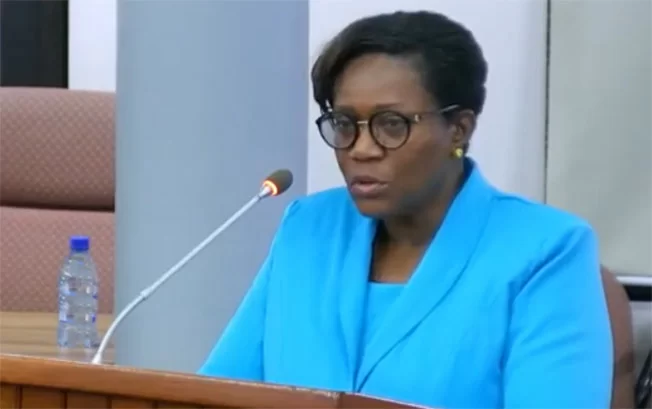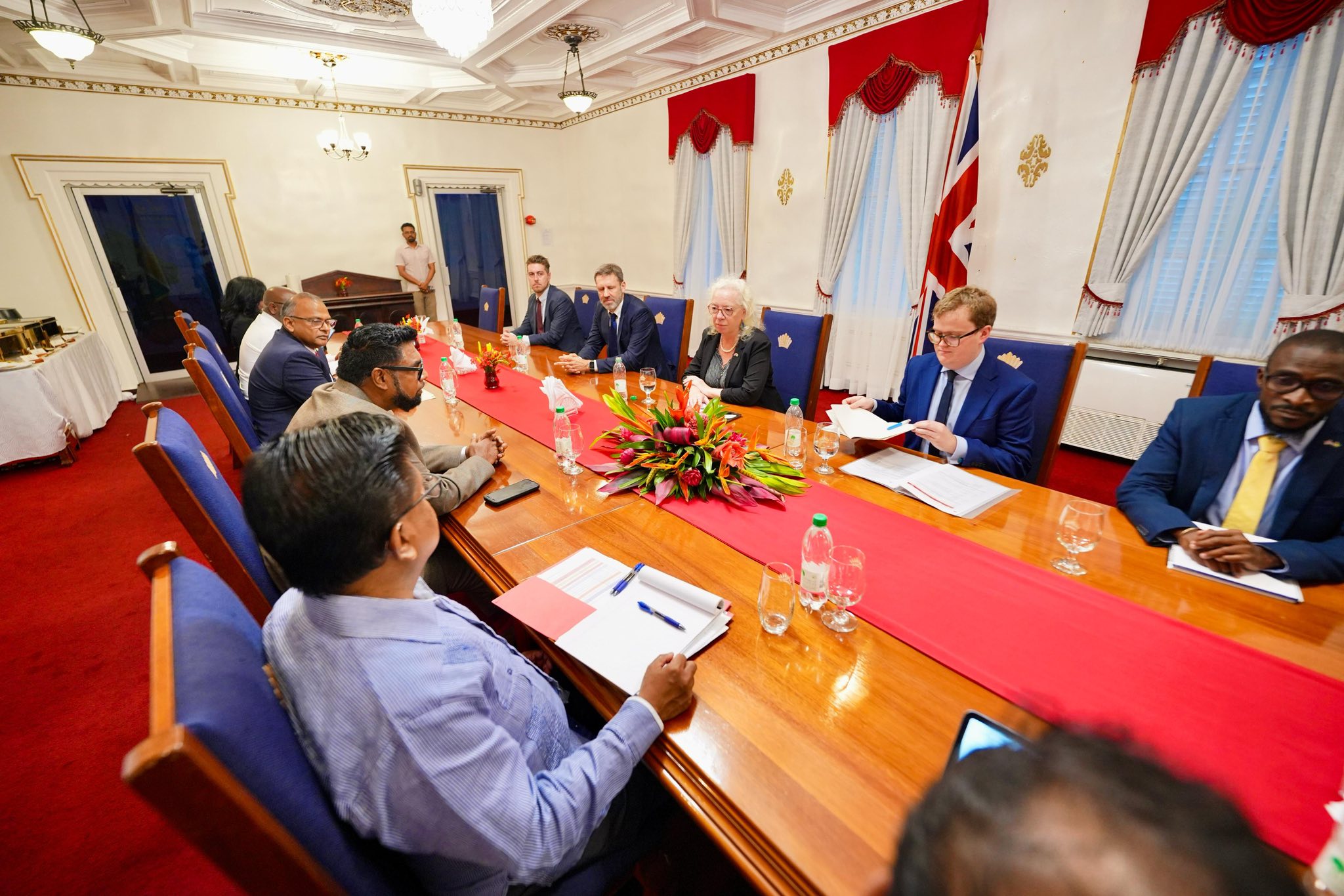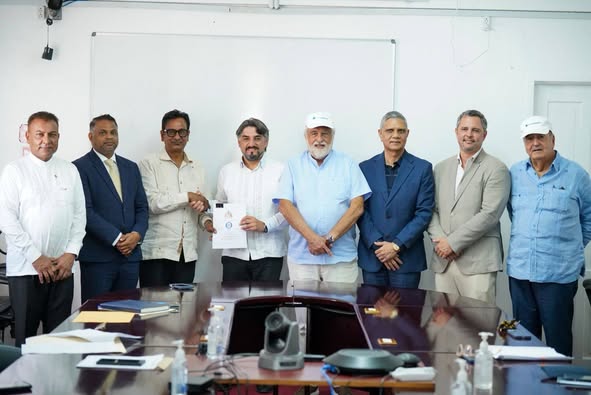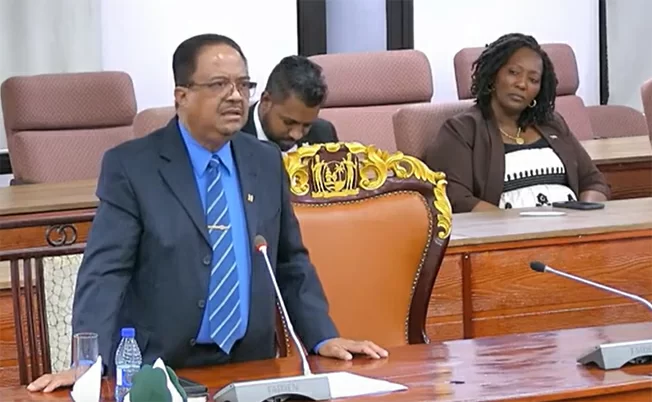On Thursday, October 9, 2025, Cuba will witness a series of solidarity events in support of Palestine, reflecting the enduring bond between the two nations. The main event in Havana will take place at the José Martí Anti-Imperialist Tribune, commencing at 7:30 a.m. and will be broadcast live on Cuban television as part of the ‘Buenos Días’ program. This initiative underscores Cuba’s unwavering condemnation of what it describes as the Israeli genocide against Palestinians, a crisis that continues to evoke global outrage due to the escalating violence and humanitarian suffering. The historical ties between Cuba and Palestine, rooted in the leadership of the late Commander-in-Chief, have evolved into a profound connection between their peoples. These events serve as a reminder of Cuba’s commitment to advocating for justice and peace in the region.
博客
-

Wijnerman: Wetswijziging is juridische reparatie, geen vrijbrief voor meer leningen
In a significant legislative move, Suriname’s Minister of Finance and Planning, Adelien Wijnerman, has underscored the necessity of amending the State Debt Law. The revision, passed with a unanimous 36 votes in the National Assembly, aims to realign the law with the country’s current financial realities rather than facilitate additional borrowing. Minister Wijnerman emphasized that the amendment is a legal correction, enabling the government to manage existing debts more effectively. She clarified that the adjustment is not a carte blanche for increasing debt but a structured approach to address financial obligations.
As of August 2025, Suriname’s total state debt stands at approximately SRD 145 billion, equivalent to 98% of its GDP—well above the legal threshold of 60%. Without this amendment, any new loans or refinancing of existing debts would constitute a formal violation of the law. The temporary measure allows the debt ceiling to be exceeded until the end of 2027, providing the government with the necessary leeway to meet its commitments, particularly in social sectors, infrastructure, tourism, and other productive areas.
The revised law mandates the government to submit an annual state debt plan alongside the budget, detailing loans, repayments, restructurings, and associated risks. Minister Wijnerman assured that the National Assembly retains its oversight role, with annual approval of the debt plan ensuring parliamentary control. She also addressed Suriname’s heavy international obligations, including a debt to the International Monetary Fund (IMF) amounting to 390% of the country’s General Resource Account.
Regarding the restructuring of Oppenheimer bonds, Wijnerman noted that repayment obligations have been deferred to 2026–2028, coinciding with the expected influx of oil revenues. However, she warned that Suriname will still face annual payments of nearly USD 200 million in interest and principal before the oil income materializes. The restructuring also introduced a Value Recovery Instrument (VRI), now valued at USD 374 million, with total costs estimated at USD 1.9 billion.
Since assuming office in July 2025, the current administration has refrained from taking on new loans, focusing instead on stabilizing debt management and improving revenue and expenditure frameworks. Ongoing projects, such as a USD 25 million Inter-American Development Bank (IDB) loan for aviation, were approved earlier and are now being executed. The government is also developing a restructuring strategy for major loans to ensure medium-term debt sustainability.
Reforms within the tax and customs departments aim to enhance revenue collection, transparency, and capacity. Minister Wijnerman announced plans to consolidate the State Debt Law, incorporating modern insights and clear norms to provide a stable legal framework. She concluded with a call for discipline and realism, stressing that the law alone will not resolve Suriname’s financial challenges. The ultimate solution lies in boosting production, exports, and the income base to achieve financial sovereignty.
-

7th International Health and Wellness Tourism Congress gains strong support in the Dominican Republic
Santo Domingo is set to host the seventh International Health and Wellness Tourism Congress from October 22 to 23, 2025, at the Marriott Piantini Hotel. Organized by the Dominican Association of Health Tourism (ADTS) in collaboration with AF Comunicación Estratégica, the event has garnered significant backing from national and international entities in health, tourism, and investment sectors. This congress has emerged as a pivotal platform for advancing medical tourism in the Caribbean. Dr. Alejandro Cambiaso, ADTS president, underscored the Dominican Republic’s state-of-the-art hospital infrastructure, international certifications, and secure environment for global patients, positioning the country as a leader in health and wellness tourism. Amelia Reyes Mora, president of AF Comunicación Estratégica and ADTS vice president, emphasized the importance of enhancing international accreditations, building strategic partnerships, and delivering exceptional patient experiences to bolster the nation’s reputation as a premier medical tourism destination. Previous editions of the congress attracted over 800 participants and 70 exhibitors from countries such as Canada, the United States, India, Mexico, Argentina, Spain, and various Caribbean nations. The event also enjoyed support from more than 110 sponsors, including hospitals, insurance firms, banks, resorts, and technology providers. Key endorsements come from institutions like the American Chamber of Commerce of the Dominican Republic (AMCHAMDR), the Association of Hotels and Tourism (Asonahores), PUCMM, the Dominican Institute for Quality (Indocal), and the Superintendence of the Securities Market (SIMV). Media partners such as Listín Diario, Dominican Today, Revista Mercado, and MediHealth ensure extensive coverage. The congress aims to showcase the Dominican Republic’s competitive edge in sustainable development, investment, innovation, and high-quality health services, reinforcing its commitment to becoming a regional leader in medical tourism. For details on registration and sponsorship, visit https://congresoadts.com or call (809) 567-2663.
-

UK increases available financing to Guyana; Ali eyes major infrastructural projects
The United Kingdom has significantly increased its financial commitment to Guyana, raising the available financing through its Export Finance (UKEF) agency from £2.1 billion to £3 billion. This move, announced on October 8, 2025, underscores the UK’s confidence in Guyana’s economic trajectory and fiscal sustainability, while also deepening the bilateral relationship between the two nations. President Irfaan Ali highlighted that the funds will be channeled into transformative infrastructure projects, including the extension of the Linden to Lethem all-weather road, the development of a deep-water port in Berbice, and modernization initiatives in the health and energy sectors. The Berbice port, a public-private venture, is expected to serve as a strategic gateway for northern Brazil, enhancing regional trade and connectivity. Additionally, plans for a second gas-to-energy project are underway, with the aim of integrating these developments into a new industrial hub. The announcement was made during a meeting between President Ali, a UKEF delegation, and the UK’s Deputy Trade Commissioner for Latin America and the Caribbean. The British High Commission emphasized that this support aligns with Guyana’s accelerated infrastructural development and its emergence as a key investment destination. Private sector leaders, including Gerry Gouveia Jr., Chairman of the Private Sector Commission, welcomed the increased financing, noting its potential to foster local economic diversification, capacity building, and international partnerships. Dr. Clinton Urling, Secretary of the Private Sector Commission, also highlighted the opportunities for collaboration between Guyanese and UK firms, emphasizing the importance of financing for private sector growth and expansion. The Guyanese delegation included key ministers, reflecting the government’s commitment to leveraging this financial boost for sustainable development and shared prosperity.
-

Ras John says Bing invited him on Boom; nobody paid him
In a recent political controversy in St. Vincent and the Grenadines, landscaper and activist Aster ‘Ras John’ John has refuted claims by Prime Minister Ralph Gonsalves that he was paid to appear on Boom FM’s OMG programme. John, a former supporter of Gonsalves’ Unity Labour Party (ULP), made headlines in August for his critical remarks about MP Saboto Caesar’s management of the agricultural sector. Gonsalves later alleged that both John and the radio station were compensated for the appearance, a claim John vehemently denies.
John stated that he was invited by the show’s host, Dwight ‘Bing’ Joseph, a personal friend, and did not receive any payment. He explained that his appearance was prompted by a public statement he made at a UWI Global Campus event, where he criticized Caesar’s handling of agriculture. Joseph confirmed that neither John nor lawyer Jomo Thomas, who also appears on the show, paid for their segments.
The controversy deepened when Thomas, a former ULP candidate and Speaker of the House of Assembly, threatened legal action against Gonsalves for suggesting that China was involved in efforts to unseat the ULP government. Thomas denied any involvement in such efforts and challenged Gonsalves’ claims as defamatory and politically motivated. He accused the Prime Minister of stifling dissent and resorting to desperate tactics to maintain power.
Thomas also addressed Joseph directly during his commentary, emphasizing that he had never paid for his appearances or facilitated John’s. He criticized Gonsalves for his intolerance of criticism and accused him of damaging the political discourse in St. Vincent. Thomas announced that he had instructed his lawyers to send a pre-action letter to Gonsalves, signaling potential legal repercussions for the Prime Minister’s statements.
John, meanwhile, reiterated his long-standing opposition to the ULP, citing dissatisfaction with the government’s agricultural policies since 2015. He emphasized that his criticisms were driven by a desire for the country’s progress, not financial gain. The ongoing dispute highlights the growing political tensions in St. Vincent as the ULP faces increasing scrutiny and opposition.
-

GPL fast-track upgrade with Dom Rep’s InterEnergy two-year contract
In a landmark move to modernize its energy infrastructure, Guyana Power and Light Inc. (GPL) has entered into a two-year contract with the Dominican Republic’s InterEnergy Group. The $15.8 million agreement, signed on October 8, 2025, aims to accelerate the transformation of Guyana’s electricity grid, enhance reliability, and advance the country’s transition to a smart grid system. The contract was awarded through a sole-sourced formula, bypassing the initially selected Canadian firm Method4, which later withdrew from the bid. The signing ceremony, attended by key stakeholders including GPL’s Executive Management Head Kesh Nandlall and InterEnergy Chairman Rolando González Bunster, marked a significant step in strengthening regional ties. Under the agreement, InterEnergy will provide supervisory, engineering, and project management consultancy services, ensuring technical compliance, timely execution, and the integration of smart technologies. The partnership also includes technical advisory services for the operation and maintenance of generation assets, audits, and recommendations for improved reliability, efficiency, and cost-effectiveness. Additionally, InterEnergy will lead smart grid integration, conduct technical gap analyses, and develop cost-effective expansion plans. The Guyana government has assured that no GPL employees will lose their jobs as a result of this collaboration. Public Utilities Minister Deodat Indar emphasized the importance of capacity building within GPL, while GPL Chairman Maurice Gajadhar hailed the partnership as a historic milestone in regional cooperation. InterEnergy’s Chairman highlighted the symbolic and strategic value of the agreement, expressing confidence in its potential to drive Guyana’s energy sector forward. The collaboration is part of a broader $400 million project to install a new transmission and distribution system, set for completion by mid-2026.
-

UN highlights progress and challenges for the Dominican Republic in achieving 2030 Sustainable Goals
The Dominican Republic is grappling with significant challenges in reducing maternal mortality, curbing teenage pregnancy, and ensuring equitable access to quality healthcare. These issues are critical to the nation’s well-being and its ability to meet the United Nations Sustainable Development Goals (SDGs) by 2030. During a recent address at the Corripio Communications Group’s Weekly Luncheon, Julia del Carmen Sánchez, the UN Resident Coordinator in the Dominican Republic, revealed that while 37.3% of the SDGs have been achieved, 40% show limited progress, and 22.7% have regressed. Sánchez emphasized the country’s dedication to reducing infant and neonatal mortality, areas where notable advancements have been made, bringing the nation closer to its 2030 targets. However, persistent setbacks include high rates of road fatalities, rising obesity levels, declining secondary school completion rates, and threats to labor rights and access to clean drinking water. Indicators in education, health, and gender equality have also remained stagnant. On a positive note, neonatal mortality has improved significantly, with the current rate at 15 deaths per 1,000 live births, nearing the target of 13. In celebration of the UN’s 80th anniversary, Sánchez announced a commemorative event on October 17 in the National District to honor the organization’s contributions to the country and recognize the Dominican Republic’s global impact, such as its role in establishing the International Day for the Elimination of Violence Against Women, inspired by the legacy of the Mirabal sisters.
-

2026 World Cup Qualification : D-Day, Haiti vs Nicaragua
Haiti’s senior national football team, the Grenadiers, is set to face Nicaragua in a pivotal 2026 World Cup Qualifying match on October 9, 2025, at the National Stadium in Managua. This encounter marks the third of six matches in the final qualifying phase for Haiti, as they aim to secure a spot in the prestigious tournament. The game is scheduled for 8:00 a.m. (Haiti time) and is expected to draw significant attention from fans and analysts alike. Historically, Haiti has dominated this fixture, with six wins out of nine previous meetings, scoring 15 goals and conceding nine. Their most recent victory over Nicaragua was a 1-0 triumph in the 2021 World Cup qualifiers. However, the Grenadiers face challenges ahead of the match, with key player Yassine Fortuné sidelined due to injury and Fabrice Picault absent for undisclosed reasons. Lambèse has been called up as a last-minute reinforcement to complete the 23-player squad. Haiti’s ambition is clear: to secure a victory in front of 17,000 spectators and reignite their dream of qualifying for the 2026 World Cup. Following this match, Haiti will face Honduras on October 13th in a return leg, after their first encounter ended in a goalless draw. The Grenadiers’ journey continues in November with matches against Curaçao and Costa Rica. Currently, Haiti sits third in Group C with two points from two matches, trailing Honduras and Costa Rica. Nicaragua, with just one point, is at the bottom of the group. This match is a critical opportunity for Haiti to climb the standings and strengthen their World Cup aspirations.
-

Rusland: Checks and balances versterken vertrouwen in financieel beleid
In a pivotal address to the National Assembly on Tuesday, Vice President Gregory Rusland underscored the critical importance of financial discipline, transparency, and oversight in managing Suriname’s state debt. Speaking during the deliberation on amendments to the State Debt Law, Rusland highlighted the shared responsibility of the government and parliament in fostering robust financial systems. ‘We must collectively strive to enhance our systems, particularly our financial framework,’ he asserted. ‘This requires society to implement the right measures to continuously improve.’ Rusland acknowledged concerns about granting the government unchecked borrowing power but reassured that the administration does not seek a ‘blank check.’ ‘Checks and balances are integral to any system. Oversight is not an act of hostility,’ he clarified, emphasizing the government’s openness to parliamentary scrutiny as a cornerstone of good governance. The Vice President expressed satisfaction with the bipartisan consensus achieved on the issue, noting that such collaboration reflects a commitment to national interests. ‘When it comes to matters vital to our country, we can find common ground. This was evident in the Electoral Regulation as well. This marks a hopeful beginning for joint decision-making in the national interest,’ he remarked. The amendment to the State Debt Law 2025 was passed with 36 votes in favor, including support from 25 coalition members and 11 opposition VHP members. The revised law grants the government temporary borrowing flexibility while strengthening oversight through a mandate for the Minister of Finance and Planning to submit an annual State Debt Plan alongside the budget. Rusland described the amendment as ‘a step toward bolstering macroeconomic stability, provided the new borrowing capacity is used responsibly.’ He concluded with a call to action: ‘Our future hinges on discipline and collaboration. Only then can we build a financially resilient Suriname.’
-

FLASH : IDB grants $100 million to help Haiti rebuild health services in the Far North
The Inter-American Development Bank (IDB) has announced a significant $100 million grant aimed at rebuilding and enhancing essential health services in Haiti’s three northern departments. This initiative, approved by the IDB’s Board of Executive Directors, seeks to save lives, prevent disabilities, and strengthen the region’s health infrastructure. The project will focus on improving the health system, conducting critical health surveys, and advancing the digitalization of healthcare services. These efforts will inform the development of a medium-term investment master plan to ensure sustainable health improvements. The program builds on previous IDB-supported social protection operations initiated in 2022, targeting the prevention and treatment of prevalent noncommunicable diseases like diabetes and hypertension, as well as infectious diseases such as cholera, tuberculosis, malaria, HIV, and human papillomavirus. Additionally, the initiative will prioritize underserved groups, including internally displaced persons, return migrants, vulnerable women, and individuals with disabilities, by developing care protocols tailored to their needs. A substantial portion of the grant will be allocated to strengthening health infrastructure, enhancing the response capacity of facilities serving priority communities. This marks the first phase of a long-term commitment to rebuild the public health network’s capabilities, starting in the greater northern region. The grant will be disbursed and implemented over 84 months (7 years), directly benefiting approximately 750,000 people in targeted communities.
